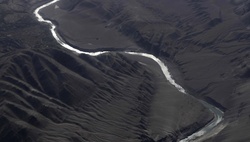 For many years river the Pact was presented as a rare diplomatic success stories between rivals India and Pakistan. For many years river the Pact was presented as a rare diplomatic success stories between rivals India and Pakistan.
But last year, longtime river Pact, which governs how the two countries share important water resources are under threat, as violence erupted in the disputed region of Kashmir.
On Monday, after a period of heightened tension between India and Pakistan, both countries need to come together for long-awaited negotiations on the controversial Indus Water Treaty. A huge system of the Indus river which supports the livelihoods in Pakistan and Northern India, originates in Tibet, flows through China and controlled by India, before being included in Pakistan.
The Treaty of Indus water fishery dates back to 1960 and governs how neighbors manage immense volume of water which is a vital resource for both countries. However, discussions in Islamabad started after 7 months after Prime Minister Narendra modi has suspended negotiations with Pakistan on water resources. It is expected that discussions this week will focus on the plans of India to use rivers to provide hydropower - something that Pakistan has persistently objected.
Modi announced in September that he wants to renegotiate the terms of his 57-year agreement on sharing water, which was seen by some analysts as a threat to the deal. "Blood and water can't flow at the same time," said modi, his press Secretary, Sri Gopal Baglay after the outbreak of violence in disputed Kashmir.
The Treaty, which was supported by the world Bank, provides that Pakistan receives water from the Indus and its two tributaries the Jhelum and the Chenab river. India has full control over the three Eastern rivers - Beas, Ravi and Sutlej and limited access to Jhelum and Zenabu.
The agreement is welcomed by experts as one of the most successful agreements on the division of water in the world. He survived the Indo-Pakistani war of 1965 and 1971 and many other confrontations between the two countries. Recently, however, tensions between the nuclear neighbors intensified, and the Treaty was again put to the test.
In September last year, armed militants have infiltrated the base of the Indian army in the garrison town of URI, killing 18 soldiers. The attack, which took place near the border de facto, was one of the deadliest at a military base in the region since the beginning of military attacks in 1989.
Later tensions flared up on both sides of the disputed border and India start what is, according to her statement, was "surgical strike" on the so-called "Line of control" with Pakistan. The ripple effect is felt everywhere
sections: Politics, World News, Accidents
|